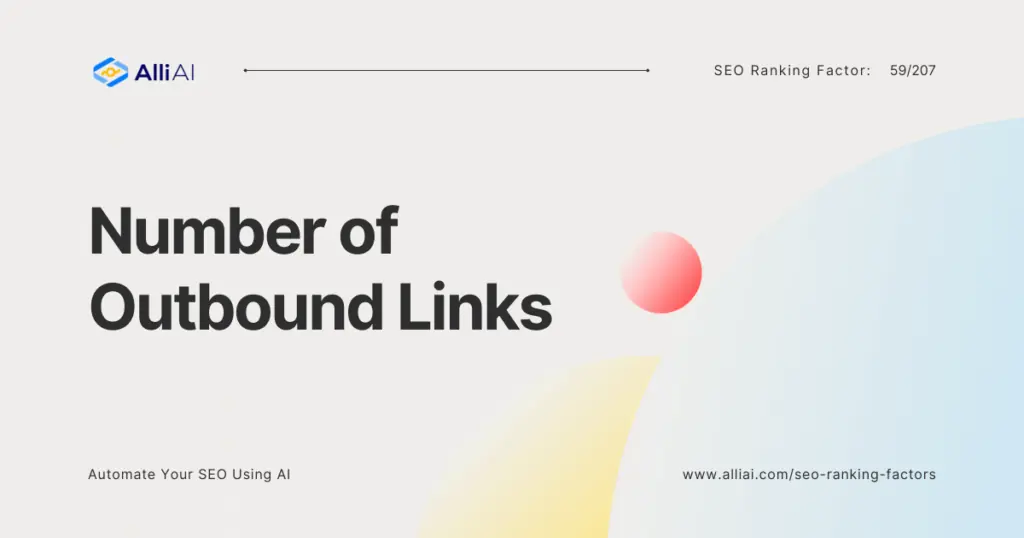What is Number of Outbound Links?
The concept of a ranking factor revolves around elements that search engines use to evaluate and rank web pages in search results. Among these, the number of outbound links holds a significant place. Simply put, outbound links are the hyperlinks present on a web page that lead to other websites. Imagine you’re having a conversation and you reference advice or facts from various experts to strengthen your argument. In the realm of web pages, these references are akin to outbound links, lending credibility and context to the content provided.
Why is Number of Outbound Links Important in SEO?
Outbound links play a crucial role in SEO for a multitude of reasons. Primarily, they help search engines understand the relevancy and value of your content. By linking to authoritative and relevant sites, you’re effectively telling search engines that your content is well-researched and offers additional value through further reading options. This, in turn, can positively influence your site’s credibility and authority, indirectly boosting your SEO ranking.
How Number of Outbound Links Affects SEO?
The impact of outbound links on SEO is nuanced. Here’s a breakdown, alongside relevant stats, to better understand their effect:
1. Quality over Quantity: A study by Moz suggests that while outbound links to authoritative sites are beneficial, overdoing it can dilute the value of your content. This goes back to the idea of a term paper; if you cite too many sources, your original argument might get lost in the references.
2. Relevancy Is Key: According to Search Engine Journal, linking to websites that are highly relevant to the content of your page can significantly improve its trustworthiness and authority, which are critical factors in Google’s ranking algorithm.
3. Potential for Partnership and Link Building: Outbound links can also serve as a networking tool. By linking to other reputable sites within your niche, you create potential for backlinks – when these sites link back to you. According to Ahrefs, sites with high-quality outbound links tend to receive more backlinks, creating a synergistic effect that boosts SEO.
4. User Experience: HubSpot highlights that outbound links that offer additional, valuable information can enhance user experience, potentially increasing the time spent on your site and decreasing bounce rates – both important signals to search engines.
FAQ
How many outbound links are too many?
There isn’t a one-size-fits-all answer, as it largely depends on the length and purpose of your content. However, it’s essential to ensure that each outbound link adds value for your readers and relates directly to your content’s topic. Quality should always precede quantity.
Do follow vs. no follow outbound links: What’s the difference?
“Do follow” links pass on link equity or “link juice” from your site to the one you’re linking to, potentially boosting its search engine ranking. “No follow” links, on the other hand, do not pass on this equity. They’re typically used when linking to unverified sources or paid links, signaling to search engines not to consider this link for ranking purposes. It’s crucial to use them judically to maintain the integrity of your site’s SEO.
How can I ensure outbound links don’t harm my SEO?
Regularly audit your outbound links to ensure they’re working and still lead to reputable, relevant sites. Using “no follow” tags for affiliate or sponsored links can also prevent potential negative SEO impacts. Additionally, offering high-quality, valuable content alongside your outbound links ensures that your site remains a beneficial resource for users and search engines alike.
Conclusion
The number of outbound links on your web pages is more than just a number; it’s a reflection of the depth of your research, the relevancy to your topic, and the value you offer to your readers. Properly managed, these links can significantly enhance your site’s credibility, authority, and ultimately, SEO ranking. Like the threads of a spider’s web, they connect your site to the broader digital ecosystem, enriching the user experience and signaling to search engines the context and quality of your content. Remember, in the grand scheme of SEO, the goal is to contribute valuable information that serves users and stands the test of rigorous search engine algorithms.






